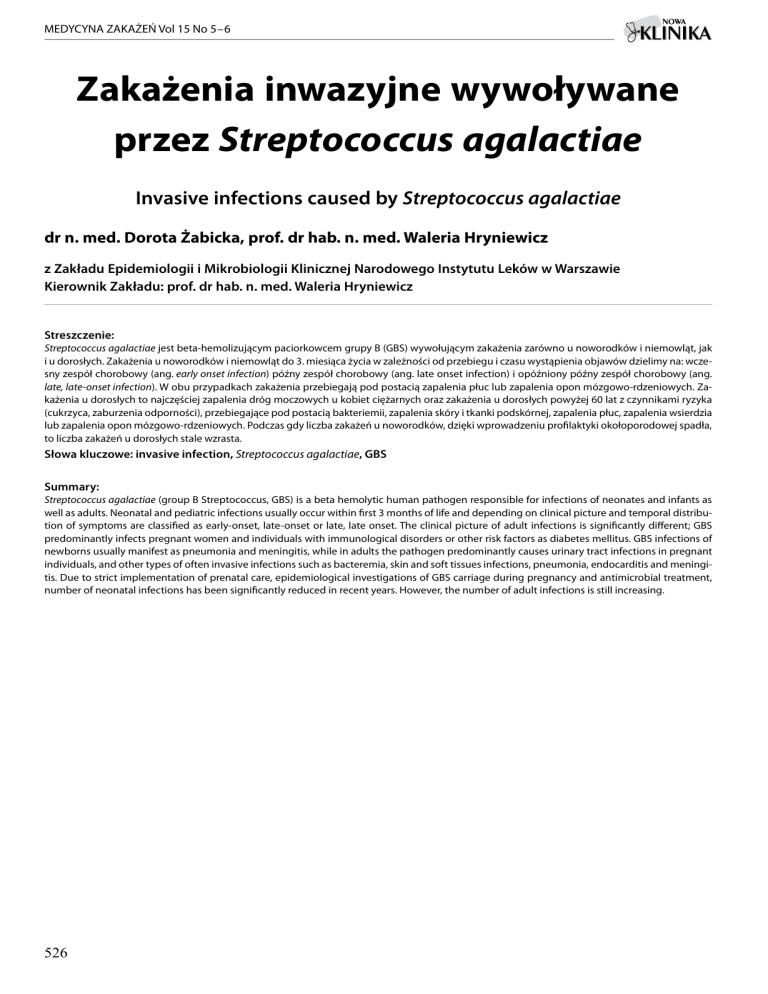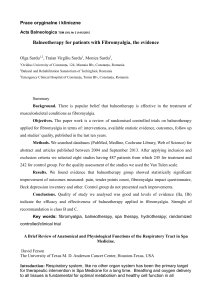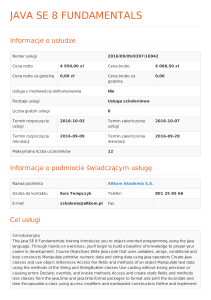
MEDYCYNA ZAKAŻEŃ Vol 15 No 5–6
Zakażenia inwazyjne wywoływane
przez Streptococcus agalactiae
Invasive infections caused by Streptococcus agalactiae
dr n. med. Dorota Żabicka, prof. dr hab. n. med. Waleria Hryniewicz
z Zakładu Epidemiologii i Mikrobiologii Klinicznej Narodowego Instytutu Leków w Warszawie
Kierownik Zakładu: prof. dr hab. n. med. Waleria Hryniewicz
Streszczenie:
Streptococcus agalactiae jest beta-hemolizującym paciorkowcem grupy B (GBS) wywołującym zakażenia zarówno u noworodków i niemowląt, jak
i u dorosłych. Zakażenia u noworodków i niemowląt do 3. miesiąca życia w zależności od przebiegu i czasu wystąpienia objawów dzielimy na: wczesny zespół chorobowy (ang. early onset infection) późny zespół chorobowy (ang. late onset infection) i opóźniony późny zespół chorobowy (ang.
late, late-onset infection). W obu przypadkach zakażenia przebiegają pod postacią zapalenia płuc lub zapalenia opon mózgowo-rdzeniowych. Zakażenia u dorosłych to najczęściej zapalenia dróg moczowych u kobiet ciężarnych oraz zakażenia u dorosłych powyżej 60 lat z czynnikami ryzyka
(cukrzyca, zaburzenia odporności), przebiegające pod postacią bakteriemii, zapalenia skóry i tkanki podskórnej, zapalenia płuc, zapalenia wsierdzia
lub zapalenia opon mózgowo-rdzeniowych. Podczas gdy liczba zakażeń u noworodków, dzięki wprowadzeniu profilaktyki okołoporodowej spadła,
to liczba zakażeń u dorosłych stale wzrasta.
Słowa kluczowe: invasive infection, Streptococcus agalactiae, GBS
Summary:
Streptococcus agalactiae (group B Streptococcus, GBS) is a beta hemolytic human pathogen responsible for infections of neonates and infants as
well as adults. Neonatal and pediatric infections usually occur within first 3 months of life and depending on clinical picture and temporal distribution of symptoms are classified as early-onset, late-onset or late, late onset. The clinical picture of adult infections is significantly different; GBS
predominantly infects pregnant women and individuals with immunological disorders or other risk factors as diabetes mellitus. GBS infections of
newborns usually manifest as pneumonia and meningitis, while in adults the pathogen predominantly causes urinary tract infections in pregnant
individuals, and other types of often invasive infections such as bacteremia, skin and soft tissues infections, pneumonia, endocarditis and meningitis. Due to strict implementation of prenatal care, epidemiological investigations of GBS carriage during pregnancy and antimicrobial treatment,
number of neonatal infections has been significantly reduced in recent years. However, the number of adult infections is still increasing.
526



